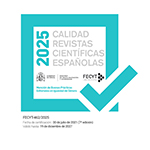The autobiographical interlocutor on "Diálogo de las empresas" (1558) and the Courtly Individualism
Abstract
This article brings forward the analysis of some essential features of the literary genre of dialogue from a Renaissance Studies perspective. The necessary link between form and content appears not only in the inner workings of the process of the argumentation, but also in the fictionalization carried out by the writer of dialogues through the distribution of his auctoritas among two or more speakers. A distinctive feature of drama --the disappearance of the authorial voice-- is absent from the generic trajectory of dialogue, especially if we consider the relevance of the autobiographical interlocutor --with the writer’s name-- from classical Antiquity to the Renaissance. The analysis of Diálogo de las empresas (1558) by Paulo Jovio furnish a possible application of the literary model described in this article.Downloads
Article download
License
In order to support the global exchange of knowledge, the journal Dicenda. Cuadernos de Filología Hispánica is allowing unrestricted access to its content as from its publication in this electronic edition, and as such it is an open-access journal. The originals published in this journal are the property of the Complutense University of Madrid and any reproduction thereof in full or in part must cite the source. All content is distributed under a Creative Commons Attribution 4.0 use and distribution licence (CC BY 4.0). This circumstance must be expressly stated in these terms where necessary. You can view the summary and the complete legal text of the licence.









